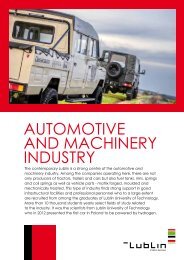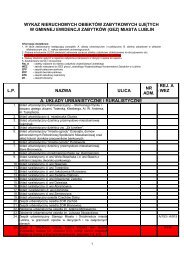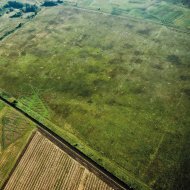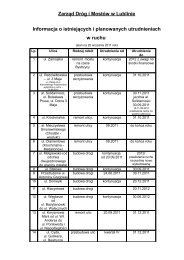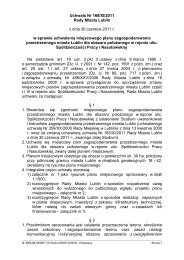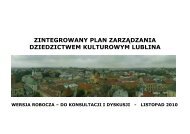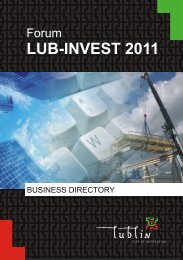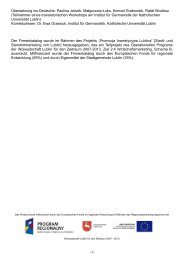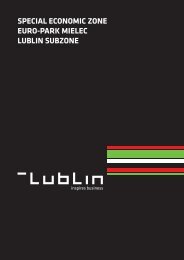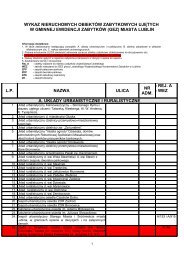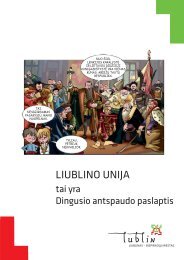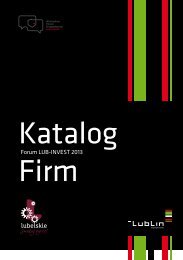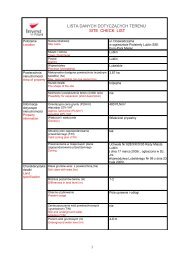The URBACT II Programme 2007 - 2013 - Lublin
The URBACT II Programme 2007 - 2013 - Lublin
The URBACT II Programme 2007 - 2013 - Lublin
Create successful ePaper yourself
Turn your PDF publications into a flip-book with our unique Google optimized e-Paper software.
Final Application Form TN <strong>URBACT</strong> <strong>II</strong><br />
6 METHODOLOGY AND USE OF EXPERTISE<br />
6.1 Methodological framework for project implementation<br />
<strong>The</strong> Hero project meetings will take place in regular intervals in order to discuss<br />
common strategies and approaches in terms of an integrated and sustainable urban<br />
development and to exchange on the actions taken at local level in each partner<br />
city. That way, a strong link between the project and the local level as well as<br />
mutual capitalisation will be ensured. Peer reviews on the Local Action Plans at<br />
halftime of the implementation phase will allow for a fruitful exchange between the<br />
project partners, the members of the ULSGs, the associated Managing Authorities,<br />
the European Commission and the European Association of Historic Towns and Regions<br />
and other external experts.<br />
At programme level, capitalisation will be organised by <strong>The</strong>matic Poles. Under supervision<br />
of the <strong>The</strong>matic Pole manager Philip Stein, the <strong>The</strong>matic Pole platform<br />
“Cities and integrated, sustainable development” to which HerO is assigned to, offers<br />
the opportunity for fruitful exchange among <strong>URBACT</strong> <strong>II</strong> networks. <strong>The</strong> creation<br />
and coordination of ad hoc working groups of experts, the creation and coordination<br />
of thematic files, the organisation of and contribution to dissemination events<br />
or the production of studies will thereby serve as useful tools for conjoint activities<br />
as well as mutual learning and benefit at programme level. As part of the <strong>The</strong>matic<br />
Pole activities, the exchange with the project’s twin partners (e.g. the<strong>URBACT</strong> <strong>II</strong><br />
project REPAIR - Realising the Potential of Abandoned Military Sites as an Integral<br />
part of Sustainable Urban Community Regeneration) allows for in-depth discussions<br />
on common approaches and strategies.<br />
Furthermore, the project HerO will capitalise on the knowledge and experience the<br />
single partner cities could gain from past EU-projects and initiatives. Some of the<br />
HerO partners, for instance, took part in the <strong>URBACT</strong> I network C.H.O.R.U.S -<br />
Cultural Heritage Operations for the Regeneration of Urban Sites, which strongly<br />
links to HerO network’s topic and which can therefore give valuable input.<strong>The</strong><br />
same applies to the INTERREG <strong>II</strong>IC project INHERIT Investing in Heritage - A guide<br />
to Successful Urban Regeneration, which will be presented to the HerO partners by<br />
the European Association of Historic Towns and Regions EAHTR.<br />
<strong>The</strong> thematic network HerO - Heritage as Opportunity will co-operate closely with<br />
EAHTR, which currently represents approximately 950 historic towns and cities<br />
covering 14 European countries. This liaison will add great value to the project<br />
work in terms of capitalising on the experiences and expertise of the EAHTR members<br />
on the one hand and a warranted wide dissemination of the HerO project results<br />
within the historic cities in Europe on the other. In addition to that, HerO intends<br />
to involve further external expertise during the course of the project.<br />
<strong>The</strong> HerO Lead Expert and further <strong>URBACT</strong> Experts will support strongly the HerO<br />
project work by bringing in their knowledge and experience.<br />
Being a Fast Track network, HerO will be represented at different events and trade<br />
fairs on European level and thereby foster the exchange with the European Commission’s<br />
DG Regio, DG Environment and DG Education and Culture.<br />
<strong>The</strong> HerO project’s main outputs “Strategy paper for the support of historic urban<br />
landscapes via structural funds” and “Policy recommendations for the improvement<br />
of historic urban landscapes”will contribute ideas for the next funding period and<br />
give input into the political discussion on regional as well as on European level.<br />
46



